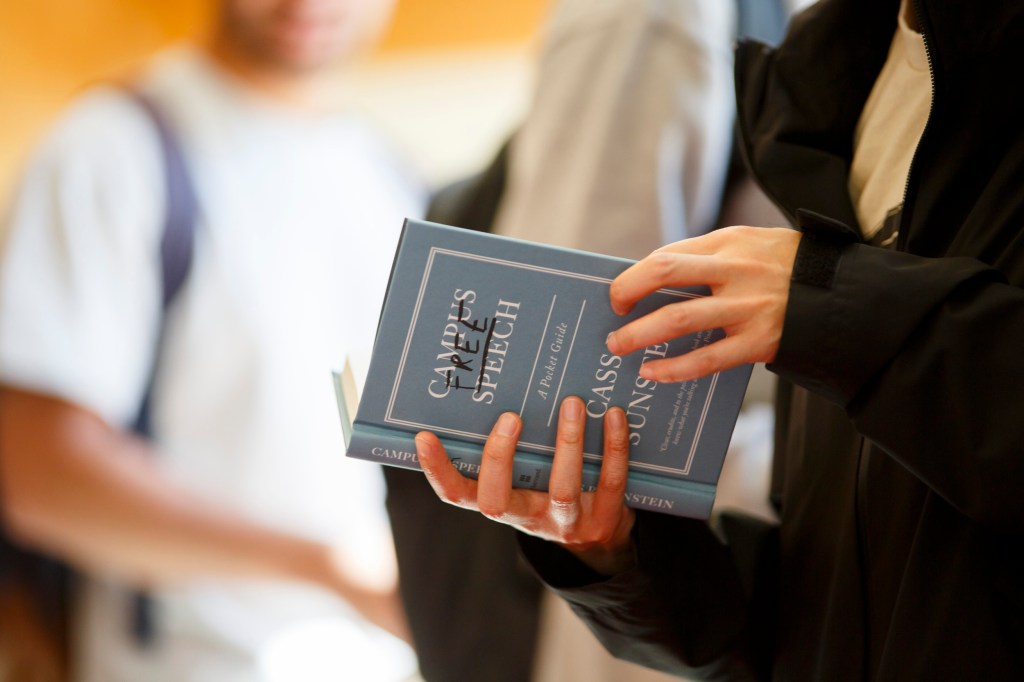
Cass Sunstein (left) and Benjamin Eidelson.
Photos by Grace DuVal
Speech is never totally free
Cass Sunstein suggests universities look to First Amendment as they struggle to craft rules in wake of disruptive protests
In the aftermath of student protests that shook campuses last spring, universities across the nation are wrestling with questions about how and when speech should be regulated. Educational institutions could turn to the First Amendment for guidance, said Cass Sunstein, Robert Walmsley University Professor, during a Tuesday talk at Harvard Law School.
Universities should strive to keep a balanced approach to free speech while protecting their educational mission.
Cass Sunstein

The First Amendment, adopted in 1791, establishes that “Congress shall make no law respecting an establishment of religion or prohibiting the free exercise thereof; or abridging the freedom of speech, or of the press; or the right of the people peaceably to assemble, and to petition the government for a redress of grievances.”
The amendment, with its prohibition on “abridging” freedoms, might seem absolute. But, Sunstein notes, that is not the case. The legal doctrine that has developed over the decades provides a set of guiding principles that include permissible restrictions, which can help universities fulfill their educational mission while balancing free speech.
“The First Amendment provides something like a diagnosis of problems,” said Sunstein in a dialogue with Professor of Law Benjamin Eidelson about Sunstein’s new book, “Campus Free Speech.” The book offers a case-study framework for resolving dilemmas around speech.
First Amendment principles offer clear guidance when it comes to regulating actions that are considered “true threats,” Sunstein said, such as students who threaten to commit violence against their classmates or destroy buildings or are part of a criminal conspiracy.
In addition, some regulation can be appropriate if it’s essential to an institution’s core mission. Such limits have been allowed for religious and military schools, for instance.
He also noted that private universities are not legally bound by the First Amendment the way public universities and public officials are. Still, he said, free speech is essential to the learning enterprise and universities, as centers of learning, should commit to preserving it.
Allowable restrictions can be based on content of speech, such as when universities ask professors not to discuss certain topics in class. They can be content-neutral, as when they don’t allow loud music in dorms after midnight, or they can be based on viewpoint, such as when professors are hired for their political views for the sake of intellectual diversity.
But universities should strive to keep a balanced approach to free speech while protecting their educational mission, said Sunstein.
“The idea of the educational mission being a permission slip for universities to regulate speech seems to me both essential and rightly evocative of the phrase ‘That way lies madness,’” said Sunstein. “Suppose there is a faculty member who thinks America is rotten to the core, there may be students who think, ‘America is the opposite of rotten to the core’ and ‘How can I learn from someone who despises my nation?’ The idea that leading to discomfort or feeling of something like exclusion as a basis for regulating speech is like the heckler’s veto, and that is not consistent with the kind of pluralism educational institutions prize.”
Besides serving as a manual or diagnostic tool, free-speech principles can also serve as a source of inspiration. Sunstein said that while writing his book he was inspired by the writings of some Supreme Court justices. He said he was particularly moved by the words of Supreme Court Justice Robert H. Jackson, who wrote the landmark ruling in West Virginia State Board of Education v. Barnette. The 1943 decision established that the First Amendment protects students from being compelled to salute the American flag or recite the Pledge of Allegiance in public schools.
“Justice Jackson wrote, ‘Compulsory unification of opinion achieves only the unanimity of the graveyard,’” said Sunstein. “There are lots of graveyards. They’re all quiet. And that’s not what we need at the greatest arsenal for democracy that is America’s educational institutions.”
He said the nation’s colleges and universities could also learn from the words of Oliver Wendell Holmes Jr., who wrote a famous defense of free speech in Abrams v. United States in 1919.
“First Amendment principles as developed over a very long period by judges of very diverse predilections have, broadly speaking, to be celebrated and honored rather than deplored,” said Sunstein. “Justice Oliver Wendell Holmes Jr. said, ‘We protect speech, the speech we hate and that we believe to be fraught with death.’ That’s quite a sentence for a Supreme Court justice to write, and it’s a good sentence.”




